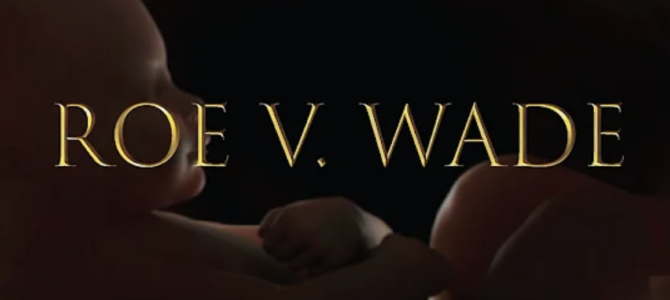
Written and directed by Nick Loeb, “Roe v. Wade” releases on Apple TV, Google Play, and other streaming platforms today.
The movie unpacks the battle between Loeb’s character, Dr. Bernard Nathanson, later co-founder of the National Association for the Repeal of Abortion Laws, prior to becoming pro-life, and Dr. Mildred Jefferson, president of the National Right to Life Committee, played by Stacey Dash. This clash of ideologies would culminate in the controversial 1973 landmark abortion decision.
“Roe v. Wade,” which Loeb touts as depicting both sides of the abortion debate, has predictably been lambasted by the legacy media for taking pro-life arguments seriously. Yet the filmmaker says he tried to craft a narrative to genuinely show what happened, and the key players involved. It just happens not to serve the pro-abortion narrative.
After premiering at the Vienna Independent Film Festival in 2020, where actor Jon Voight took home best supporting actor for his performance as Supreme Court Justice Warren E. Burger, “Roe v. Wade” premiered at the Conservative Political Action Conference in February. About 1,500 were in attendance at the event space in Orlando, Florida, limited due to social distancing requirements.
Loeb told The Federalist a little about his aspirations for the film and what it was like behind-the-scenes writing and directing a film about a landmark Supreme Court case that has rarely been touched in the media.
On How He Ended Up Pursuing The Project
“I’ve been involved in the film business for 20 years. I couldn’t believe no one had made a movie on the most famous court case in American history. I assume that is because maybe it was some boring courtroom drama. And when I started digging into it, I realized the lies and manipulation and the craziness that sort of went down, and how it gets to the Supreme Court and how it’s decided came across to me like a JFK Oliver Stone conspiracy really. So I thought it’d be entertaining.”
On The Film’s Entertainment Versus Informative Value
“The great thing about [‘Roe v. Wade’] is there is a tremendous amount of information. People come out and say ‘Man, I gotta see that again to keep on learning.’ But at the same time, it’s fun. We’ve got everything from police car chases to courtroom drama.”
On Coverage of Roe v. Wade At The Time
“From a political point of view, I think it is interesting how nothing has changed in 50 years regarding fake news. Fake news was essentially driven predominantly by the people trying to get this case to the Supreme Court and get it decided. They came out and admitted they completely fabricated statistics—they planted fake stories.”
“At least today, and I’m sure it was much more random back then because you didn’t have social media, you didn’t have as many periodicals as there are today on the other side. And so what people said was sort of ‘fact,’ and it was much easier to manipulate the media. That’s one of the predominant things you see through the film.”
On The Production
“It should have been a five-episode, limited series. The problem is to do a limited series you have to get someone like Netflix or Hulu to agree to put that on. And that wasn’t going to happen.”
“So my only avenue to get this story out was to get it down to a two-hour movie, which was incredibly difficult because there were so many players involved on both sides. We had to pare it down. Initially, when we shot the movie it was two hours and 20 minutes because we got into a lot of history of the backstories of feminism. We had to make it a little more linear. It was too many characters.”
On Obstacles In A Left-Leaning Hollywood Industry
“Listen, to make an independent film is challenging regardless of position. These were the challenges on top of the raising of money and trying to put a film together, where, you know, agencies are telling actors not to do the film. Some locations would not issue us a permit to shoot there and things like the media making up stories was not helpful either.”
“We shot our movie under a pseudonym. The media went wild and said ‘they’re shooting the movie in secrecy!’ Well, guess what? So do all the Marvel movies. They all shoot under pseudonyms and secrecy, but you don’t hear the media talking about that.”
“People came out of the woodwork to help give us free locations and bring us food and give us money. I can tell you the strangest things would happen — every time we would run out of money, magically, money would show up from somebody. For lack of a better term, I’m not religious, but it was like the hand of God.”
On The New York Times’ Scathing Review
“You know, everybody has an opinion and I think it’s hard for people embedded in a movement one way or another to take themselves out of it. Be open-minded. If you’re involved in the pro-choice movement or a pro-choice journalist, you are going to feel that an attack on your position is going to take away pride.”
“I think most Americans today are somewhere in the middle. The majority of my friends who have seen the movie, who are Democrats or pro-choice Republicans, all say it’s extremely well-balanced.”
On His Primary Goal
“I like to say that if it changes hearts and minds, that’s great. But as a society, we need to take abortion a lot more seriously. I think a lot of people do, but you’ve got a small fraction of people out there who have started organizations like Shout Your Abortion or actresses coming out [celebrating an abortion]. What you learn from an emotional perspective is that life begins at conception, which is what the protagonists learn to do.”
“Whether people walk away from the film and convert or they want to take a pause, that’s the best I can hope for. Abortion is removing the life of a human and you’re making a very serious choice. It’s not something to be proud of or put on a pedestal.”








